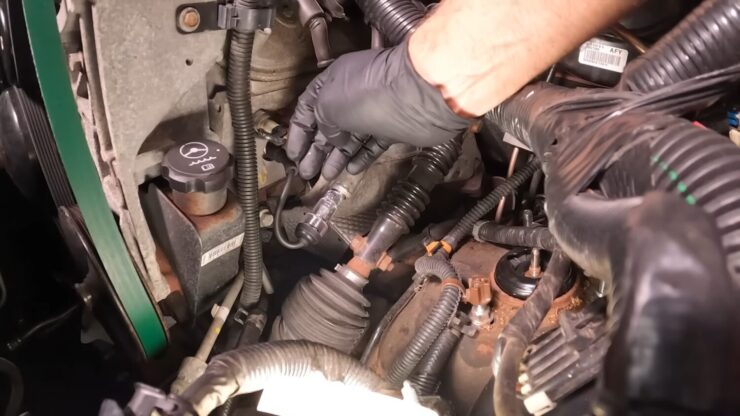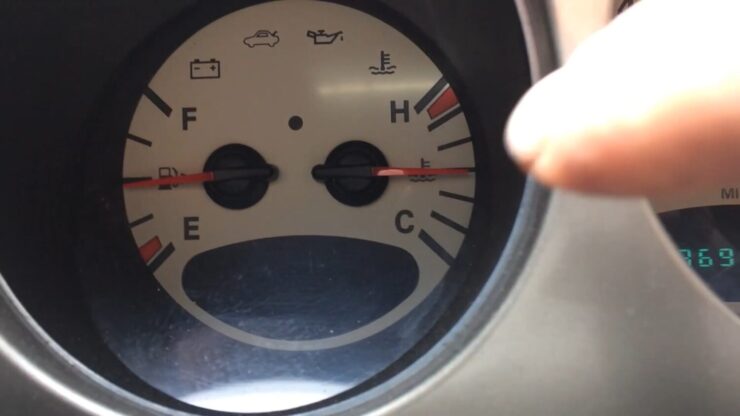Automobiles have always been a fascinating blend of art and science, a testament to human ingenuity and engineering prowess. Throughout my years deeply entrenched in this world, I’ve borne witness to a multitude of challenges that drivers, from the seasoned car aficionado to the daily commuter, grapple with.
One such challenge, both perplexing and intriguing, is the phenomenon of a vehicle that, despite its initial reluctance during ignition, transitions to run with unparalleled grace and efficiency once started.
I’ll dissect this enigma, journeying through its root causes, understanding the intricate mechanics at play, and ultimately, offering pragmatic, actionable solutions to ensure every drive is a memorable one.
The Ignition System
The ignition system is akin to the heartbeat of a vehicle. It’s responsible for initiating the engine’s operation, setting everything in motion. Without a functional ignition, your vehicle remains stationary, no matter how well-maintained the other components might be.
Every time you turn the key or press the start button, the ignition system springs into action. It sends an electrical charge to the spark plugs, igniting the air-fuel mixture in the engine’s combustion chambers. This ignition is what sets the pistons in motion, leading to the smooth operation of the engine.
Battery and Alternator
The battery and alternator play pivotal roles in ensuring your vehicle’s smooth operation. They’re like the dynamic duo powering the superhero that is your car.
- Vehicle’s Power Source:
- Symbiotic Relationship: This ensures the vehicle always has a consistent power source, whether stationary or in motion.
- Battery Role: The battery provides the initial energy required to start the engine. It powers the starter motor, which in turn cranks the engine.
- Engine Operation: Once the engine is running, the alternator takes over.
- Supplies electricity to various vehicle components.
- Charges the battery simultaneously.
Common Culprits of Starting Issues

Now that we’ve covered the basics, let’s delve into the common reasons a vehicle might have trouble igniting but runs smoothly once it does. By understanding these culprits, you can better diagnose and address the issue. The fuel system is a critical component of any vehicle.
It ensures that the engine receives the right amount of fuel at the correct pressure. Any anomalies in this system can lead to ignition issues. A clogged fuel filter or malfunctioning fuel pump can prevent the engine from receiving the necessary fuel to start.
When the engine manages to ignite, it might run smoothly if there’s just enough fuel trickling through. Regular maintenance and checks can prevent such issues, ensuring that the fuel system remains in optimal condition. Spark plugs are small but mighty components of the ignition system.
They’re responsible for igniting the air-fuel mixture in the combustion chambers, leading to the engine’s operation. Over time, spark plugs can wear out or become fouled with carbon deposits. This wear and tear can lead to a weak spark, making it challenging for the engine to ignite.
Once the engine manages to start, it might run without any hitches. It’s essential to replace spark plugs at recommended intervals to ensure consistent ignition.
Addressing and Preventing Starting Issues
Prevention is always better than cure. By addressing potential problems early and maintaining a regular check-up routine, you can ensure that your vehicle remains in top-notch condition, minimizing ignition issues.
Regular Maintenance Checks
Routine checks are the first line of defense against ignition issues. By regularly inspecting your vehicle’s various components, you can identify potential problems before they escalate. Check the battery terminals for corrosion, ensure that the spark plugs are in good condition, and inspect the fuel system for any anomalies.
By addressing these issues early, you can prevent more significant problems down the line, ensuring that your vehicle starts smoothly every time.
Investing in Quality Components
Not all vehicle components are created equal. Investing in high-quality parts can make a world of difference in your vehicle’s performance and longevity. Opt for reputable brands when replacing spark plugs, batteries, or any other components.
While they might be slightly more expensive upfront, they can save you money in the long run by preventing frequent replacements and potential ignition issues.
The Role of Temperature

Temperature can play a surprisingly significant role in how well a vehicle starts. Both extremely cold and hot conditions can affect various components of a car, leading to ignition challenges.
Cold Weather Challenges
Cold weather can be a vehicle’s worst enemy when it comes to starting. The drop in temperature can affect the battery’s efficiency, making it harder for the engine to crank.
- Engine Oil in Cold Conditions:
- Oil Viscosity: In cold conditions, engine oil thickens. This increased viscosity can pose challenges for engine components’ movement.
- Ignition Difficulties: The thickened oil can cause the engine to struggle during ignition.
- Engine Warmth Adaptability: As the engine warms up, the oil’s fluidity improves, leading to smoother operations.
- Mitigation Strategy: Using winter-grade oil can be beneficial to address this issue during colder months.
Hot Weather Hurdles
While cold weather poses its challenges, hot weather isn’t without its problems. High temperatures can cause the battery to overheat, reducing its lifespan and efficiency.
- Hot Weather Impact on Vehicles:
- Fuel Evaporation: In hot conditions, fuel can evaporate faster, which might lead to a lean air-fuel mixture. This can make engine ignition more challenging.
- Engine Adaptability: Once started, the engine can often adjust to the lean mixture and run smoothly.
- Mitigation Strategies:
- Maintain a robust cooling system.
- Preferably park in shaded areas to counteract the effects of hot weather.
Electrical System
The electrical system of a vehicle, though often overlooked, plays a crucial role in its ignition and overall operation. Any issues within this system can lead to starting challenges.
Starter Motor Concerns
The starter motor is responsible for cranking the engine during ignition. If this component malfunctions, the engine might struggle to start. A worn-out starter motor might not provide the necessary torque to get the engine running. The starter motor’s role diminishes, allowing the vehicle to run smoothly.
Listening for a clicking sound when trying to start the car can often indicate a starter motor issue.
Faulty Wiring or Fuses
Wires and fuses act as the lifelines of a vehicle’s electrical system. Any damage or faults within them can lead to ignition challenges.
| Issue | Explanation |
| Corroded Wires/Blown Fuses | Interrupt electrical flow, hindering engine start |
| Engine Performance | Once started, the engine may run smoothly |
| Preventative Action | Regularly inspect and replace damaged wires/fuses |
The Role of Sensors and Computers
Modern vehicles come equipped with a plethora of sensors and computers that monitor and control various functions. While they enhance the car’s efficiency and safety, they can also be sources of ignition issues.
Malfunctioning Sensors
Sensors monitor everything from air-fuel mixture to engine temperature. If any of these sensors malfunction, they can send incorrect data to the vehicle’s computer, leading to ignition challenges. For instance, a faulty temperature sensor might indicate that the engine is overheated when it’s not, preventing the car from starting.
When the engine manages to bypass this incorrect data and start, it might run smoothly. Regular diagnostic checks can help identify and address malfunctioning sensors.
Onboard Computer Glitches
| Engine Control Unit (ECU) | |
|---|---|
| Function | Controls various aspects of a vehicle’s operation using data from sensors. |
| Potential Issues | ECU glitches leading to ignition challenges. Misinterpretation of data or malfunctioning, preventing engine start. |
| Post-Ignition Behavior | Once the engine starts, the ECU might reset, allowing smooth vehicle operation. |
| Maintenance Suggestions | Periodic software updates and diagnostic checks for optimal ECU performance. |
Fuel Quality and Its Impact
The quality of the fuel you use can significantly influence the ignition process. While it might seem trivial, using subpar fuel can lead to various issues, including starting challenges.
Contaminated Fuel Issues
Contaminated fuel, laden with impurities, can wreak havoc on an engine. These impurities can clog the fuel injectors, leading to an uneven or insufficient fuel supply during ignition. When the engine doesn’t receive the right amount of fuel, it might struggle to start.
The continuous flow of fuel might help push out minor contaminants, allowing the vehicle to operate smoothly. Regularly using fuel from reputable sources and occasionally using fuel additives can help combat this issue.
Octane Levels and Engine Compatibility
Different engines are designed to run on specific octane levels. Using a lower octane fuel than recommended can lead to engine knocking, which might make ignition challenging. Once the engine manages to start, the knocking might reduce as the engine adjusts its timing or as the fuel mixes with residues of higher octane fuel in the tank.
Always ensure you’re using the right octane level for your vehicle, as specified in the owner’s manual.
Mechanical Wear and Its Consequences

Over time, mechanical parts wear out. This wear and tear can influence how well a vehicle starts, even if it runs fine post-ignition.
Timing Belt and Chain Concerns
The timing belt or chain ensures that the engine’s valves open and close at the correct times. If this component wears out or slips, it can lead to ignition challenges. A misaligned timing belt might make it difficult for the engine to start due to improper valve timings.
When the engine starts and runs at higher RPMs, the slight misalignment might become less noticeable, allowing the vehicle to operate smoothly. Regular inspections and timely replacements can prevent such issues.
Compression Issues
For an engine to start and run, it needs to maintain a certain compression level in its cylinders. Wear and tear in the piston rings or valve seals can lead to reduced compression. Low compression can make it challenging for the engine to ignite as the air-fuel mixture might not achieve the required pressure.
Once the engine starts and heats up, the components might expand slightly, improving the compression and allowing the vehicle to run smoothly. Regular engine checks and maintaining oil levels can help in addressing compression-related issues.
The Human Factor

Lastly, it’s essential to consider the role of the driver and their maintenance habits. Sometimes, the way a vehicle is used and maintained can influence its ignition process.
Infrequent Use and Stagnation
Vehicles that aren’t used frequently can face starting issues. Stagnation can lead to battery drainage, fuel degradation, and even rusting of certain components. When a vehicle is left unused for extended periods, the battery might lose charge, making ignition challenging.
The alternator can recharge the battery, and the vehicle might run smoothly. It’s advisable to start and run a vehicle periodically, even if it’s not used regularly.
- Importance of Regular Maintenance:
- Vehicle Longevity: Regular maintenance ensures a vehicle’s longevity and smooth operation.
- Consequences of Neglect: Neglecting routine checks can escalate minor issues into significant challenges.
- Specific Issues and Outcomes:
- Spark Plugs: Not replacing worn-out spark plugs can lead to ignition challenges.
- Battery: Ignoring a weak battery can also hinder engine starting.
- Post-Ignition Performance: Once the engine overcomes these hurdles, it might run without any issues.
- Recommendation:
- Adhere to a regular maintenance schedule.
- Address potential issues promptly for a smooth ignition process.
FAQs
How often should I replace key components related to starting, like the battery or starter?
While there’s no one-size-fits-all answer, batteries generally last 3-5 years and starters 7-10 years. It’s essential to monitor their performance and replace them when they show signs of wear or inefficiency.
Are there any signs on the dashboard that can help me identify the issue?
Yes, warning lights related to battery, oil, engine, or fuel can provide clues. For example, a battery light might indicate charging issues, potentially pointing to a battery or alternator problem.
How often should I inspect the starting system of my car?
It’s a good practice to have your starting system checked annually or whenever you experience consistent issues with starting your vehicle.
Can a bad spark plug cause starting issues?
While bad or worn-out spark plugs can cause poor performance, misfires, and reduced fuel efficiency, they typically don’t cause hard start issues unless multiple plugs are failing simultaneously.
Could my car’s computer or electrical system be the problem?
Issues with the car’s computer or electrical sensors can lead to starting problems. If sensors that manage air-fuel mixture or ignition timing malfunction, they can affect startup.
The Bottom Line
From the foundational components to the subtler nuances of user habits and environmental influences, I’ve realized that a car is truly a marvel of engineering, each part contributing to the grand symphony of its operation.
While there might be those initial moments of hesitation or uncertainty, I firmly believe that with the insights and knowledge we’ve gathered, anyone can transform these fleeting challenges into opportunities for understanding and growth.
My hope is that it not only enlightens but also empowers you, the reader, with the tools and confidence to navigate any automotive challenge that comes your way.
Related Posts:
- Toyota Car Dealer Near Harford County MD - Car Buying Tips
- Why Is My Car Leaking Water? - Decoding the Mystery…
- What's the Best Toyota Car for Car Camping? A…
- Toyota Car Dealer Near Bel Air 2024 - Best Place For…
- Used Toyota RAV4 - Tips for Buying Used Car
- Difference Between 235 and 245 Tires - Best Suited…













